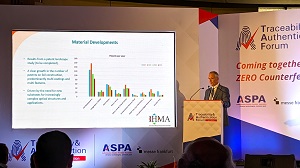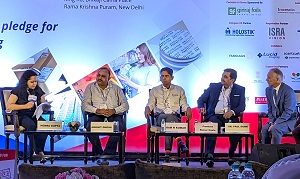
If Day 1 of the 5th Traceability and Authentication Forum 2023 conference in New Delhi gave an overview of the counterfeiting landscape in India, on Day 2 the experts discussed in detail the problems and strategies as well as shed light on emerging technologies to deal with the issue. The conference was organized by the Authentication Solution Provider’s Association (ASPA) and Messe Frankfurt on 6 -7 July 2023 at Delhi’s Hyatt Regency.

Paul Dunn, chairman of the International Hologram Manufacturers Association (IHMA), highlighted the importance of holograms to secure the authenticity of a particular product. He explained how IHMA has adopted a new optical vortex phase-shifting holography (OVPS) method to avoid the replication of holograms, which was a cakewalk in the past years.
“The companies were not much concerned about counterfeiting. Once they got to know the importance of a security barrier to fight counterfeiters, they moved toward new technologies, be it holograms or QR codes, to tackle the loss they face due to counterfeiting,” Paul said.
Deepak Sharma, assistant drugs controller in the Delhi government, discussed the upcoming plans to implement bar codes on medicines to track their authenticity. “More than 300 medicines produced or retailed in India will have to carry a web-linked dynamic QR code or barcode, primarily on primary packaging, from 1 August 2023, to tackle the counterfeiting market in the pharma industry.” Sharma demonstrated how a consumer can track down the authenticity of the medicine by scanning the QR code.
Trust deficiency
According to Ram N Kumar, CEO of NirogStreet, a platform for Ayurveda doctors, the pharma market is facing a trust issue with consumers because of the availability of counterfeit products. “Fake Gucci is ok, but fake medicine is not. Counterfeiting is less of a challenge for the manufacturer but more of the patient’s health”.
The pharma industry and authentication solution providers are collaborating to win the trust of the consumer in medicinal products, K Madan Gopal, advisor, National health systems resource center, said. “It will be beneficial for both the manufacturers and the consumers as well.”

“We need to invest in proper software and technology to track counterfeiting and gain the confidence of the consumers,” said Abhijit Ghosh, assistant drugs controller, Delhi government.
Affordability
Madan Gopal said the consumer is also responsible for the boom in the fakes market. “We can leverage tech, but as counterfeit products are available at a good discount, the consumer moves toward the duplicate product,” he said. He said a few medicines are available at cheaper prices at Jan Aushadi Kendras but there is a need to work on making available more drugs at lower rates to divert consumers from counterfeit products.
Along with the end product, the technology also needs to be affordable to check the counterfeit market. “Inclusion of blockchain in the whole process of tracking of the product has its limitations as the information will not be accessible by the end consumer,” said Ram Kumar.
“The consumer is ready to pay for the genuine product but finds it difficult to differentiate the original from fakes,” says Pankaj Kumar Pataudi, head-SCM, Godfrey Phillips India.
Lack of education
In a session moderated by Naresh Khanna, editor, Packaging South Asia, the members of the panel RG Agarwal, group chairman, Dhanuka Agritech; Vishal Choudhary, deputy industrial adviser, ministry of chemicals and fertilizers; Pankaj Kumar Pataudi, discussed the problems and strategies for the future market to tackle the counterfeiters.
The agriculture industry is also in the grip of counterfeiters. RG Agarwal says the lack of education among farmers has been an asset for the counterfeiters. “A farmer is not able to differentiate between a hologram and a normal aluminum sticker as both seem the same to him. So an aluminum sticker, which is easily available, is what a counterfeiter needs to sell the fake products.”
The farmers use unverified chemicals and pesticides, which produce harmful products that lead to health issues, the experts said.
Others feel even the educated audience should be aware of counterfeit products. “They should take the responsibility of checking the authenticity of the products that they buy or consume. People should scan the QR code to check the authenticity. They should also have the knowledge of checking the authenticity,” says Agarwal.
Coming to startups, which are the most hit by fakes, Diwaker Bharadwaj, president, Polycab India, says these companies need to invest in proper tech to analyze the market on the ground level. As the leakage happens at the retail level, he asks all startup companies to go to the field to analyze the market and find the root cause of the counterfeiting of their products.
Solutions and laws
Highlighting solutions, Anubhav Jain, brand protection lead, Jockey India, laid down certain suggestions for the government, manufacturers, and consumers. “As a manufacturer, one needs to improve the packaging and security in such a way that it would be difficult to replicate and easier to differentiate. “The government needs to make and influence policies and the consumers need to make themselves aware about the fake and original.” He expressed concern over the absence of a strict penalty structure for counterfeiting.
The laws against counterfeiting are such nowadays that the owner doesn’t need to go through the product lifecycle management (PLM) process before filing a case. “The whole litigation process for anti-counterfeiting is not heavy on the pockets of the original owner,” said Vikrant Rana, managing partner, SS Rana and Co.
In the protection of IP rights, Shwetasree Majumdar, managing partners, Fidus Law Chambers, spoke about judicial activism. “As the courts are now more aggressive in tracking down and blocking fake websites, the companies are turning to the courts to tackle the counterfeiters.”
Prashant Gupta from K & S Partners believes that as a lawyer, one needs to be properly aligned with the latest technology because the counterfeiters are smarter than the lawyers. In reply to the statement by Prashant Gupta, Vikrant Rana said, “Cutting-edge judiciary for cutting edge problems.”







